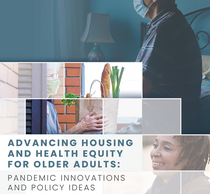New Report Highlights Lessons from the Pandemic to Advance Housing and Health Equity for America’s Older Adults

CAMBRIDGE, MA – During the COVID-19 pandemic, many older adults faced social isolation and disruptions in access to food, medical care, and supportive services. In response, organizations that support older people improvised solutions to address these challenges. A new report out today, Advancing Housing and Health Equity for Older Adults: Pandemic Innovations and Policy Ideas, examines how these responses, most of which were intended to be temporary, might improve housing and supports for older adults and address longstanding inequities.
Even before the pandemic, millions of older adults in the US struggled to pay for housing, causing them to spend less on food, healthcare, and other necessities. The pandemic exacerbated these issues: not only did its economic fallout affect older adults, but it shuttered important community resources and strained the care workforce. As a result, inequalities among older adults—some of them rooted in structural discrimination in housing and public policy—deepened.
In the new report, a collaboration between the Harvard Joint Center for Housing Studies (JCHS) and The Hastings Center, authors Jennifer Molinsky (JCHS), Nancy Berlinger (Hastings), and Bailey Hu (JCHS) employed a housing lens to examine the importance of home and neighborhood to older adult health and wellbeing. “The housing lens helped highlight that where people live affects their quality of life, access to services, and ability to afford their home and the supportive services they need to remain in that home,” says Molinsky, project director of the Housing an Aging Society Program at the Harvard center. “It helped shine a light on the complexities and inequities people face when they seek to age in place, which were brought into sharp relief by the pandemic.”
Drawing from more than 200 examples of housing-focused pandemic responses nationwide, and informed by a diverse network of policymakers, practitioners, advocates, and researchers, the report provides a comprehensive set of observations and recommendations for the future. Among them:
- Age-friendly networks played a critical role in information sharing, advocacy, and the delivery of goods and services during the pandemic. Funders, including government agencies and foundations, can play a larger role in nurturing the development of interorganizational networks and partnerships, especially ones that include local organizations trusted by older adults.
- Collaboration with older adults was essential in devising pandemic responses. Engaging older adults, people with disabilities, and caregivers in planning processes helps ensure that plans meaningfully include the full population.
- Flexibility in regulations and funding enabled many pandemic responses. Going forward, some of these responses might be made permanent or flexibility could be built in to ensure innovation in non-emergency times.
- Services delivered to the home were particularly valuable during the pandemic, especially during periods of sheltering at home, and service coordinators played particularly important roles in publicly-assisted housing. Adequate funding is needed to expand these services to more older adults.
- During the pandemic, the physical design, safety, and infrastructure of homes and neighborhoods mattered more than ever. Architects, developers, planners, and building managers should work to ensure everyone has access to fresh air, broadband, and accessible homes and neighborhoods.
- Some pandemic responses succeeded despite barriers to coordination and collaboration. Strengthening the connections between housing, healthcare, and social service programs requires coordinating subsidies and incentives, sharing data, and establishing forums for collaboration.
A more equitable future for older adults requires disrupting a narrative around aging that largely centers the healthcare system in policy discussions. “The housing lens we developed through this study is a new tool for policy analysis and development,” says Berlinger. “It reflects the ethical and social importance of housing to safety, health, and wellbeing, and focuses our attention on the moral imperative to balance private-sector options available only to the wealthy minority of older adults with far greater attention to housing equity in late life." The importance of home and housing in the COVID-19 pandemic, and the range of innovations and policy ideas that arose from the need to keep people safe at home, can be the foundation of a new narrative about housing as the linchpin of wellbeing for older adults.
Advancing Housing and Health Equity for Older Adults: Pandemic Innovations and Policy Ideas will be released in a live webcast today at 11:00 am ET and registration is required.
Join the conversation on Twitter with #covid19recapp
MEDIA CONTACTS:
Kerry Donahue, Associate Director of Communications, (617) 495-7640, [email protected]
Susan Gilbert, Director of Communications, (845) 424-4040 x244, [email protected]
